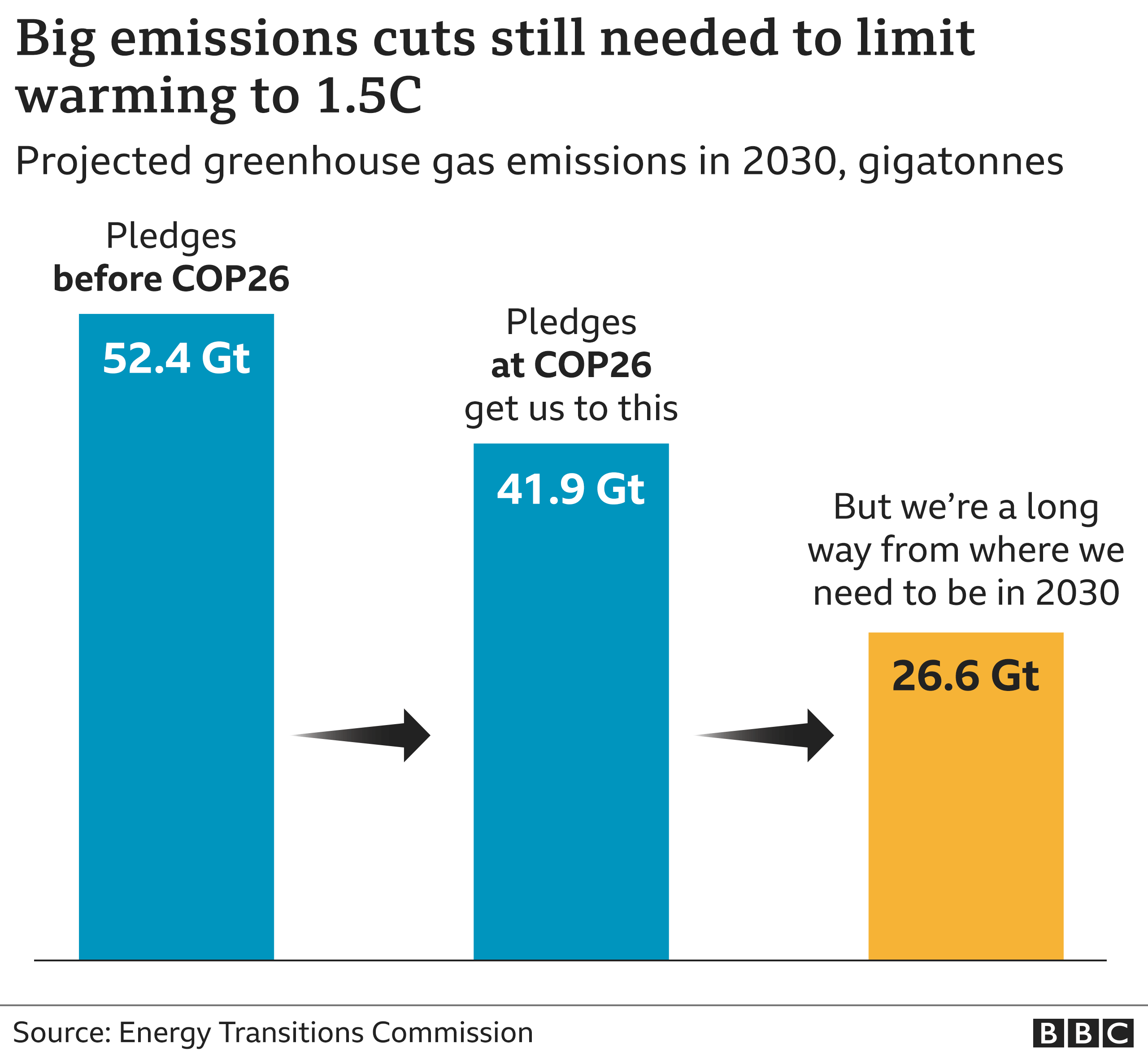BBC News 13 November 2021
Delegates in Glasgow are in final talks over a deal that aims to avert the most severe impacts of climate change.
Negotiators are meeting in huddles to iron out differences over issues like funding for poorer countries to reduce emissions and payments for damage from climate change.
COP26 president Alok Sharma told negotiators he wanted a deal done on Saturday.
And he said the current draft "really moves things forward."
The key achievements in the agreement so far are the unprecedented inclusion of a commitment to phase-out coal, re-visiting emissions-cutting plans on a more regular basis and increased financial help for developing countries.
But developing nations are unhappy about a lack of progress on what's known as "loss and damage", the idea that richer countries should compensate poorer ones for climate change effects they can't adapt to.
Promises in Glasgow will not be enough to limit global warming to 1.5C. It is a key part of the 2015 Paris agreement that most countries signed up to.
Scientists say that limiting temperature rise to 1.5C compared to pre-industrial levels will protect us from the most dangerous impacts of climate change.
Meeting the goal requires global emissions to be cut by 45% by 2030 and to zero overall by 2050. One example of the impact of global temperature rise above 2C is the death of virtually all tropical coral reefs, scientists say.
One estimate by the Climate Action Tracker calculated that the planet is still set to warm by 2.4C if the current pledges are all met.
But experts say the current target is still achievable: at COP15 in Copenhagen more than a decade ago, estimates suggested the world was heading for between 3.5 and 4.2C of warming.
The new version of the agreement released earlier on Saturday continues to refer to "accelerating efforts towards phase-out of unabated coal power and inefficient fossil fuel subsidies" - watered-down commitments that have been criticised by campaigners, even though some observers underlined that it is the first time coal is explicitly mentioned in UN documents of this type.
China and Saudi Arabia are said to be among a group of countries that have been seeking to remove references to fossil fuel subsidies.
New row in the horizon?
The major takeaways from this latest draft are that - barring a few tweaks - the key passages about ambition and fossil fuels remain intact.
However, what may turn out to be an important issue is the lack of a funding facility for what's known as "loss and damage".
This issue is about the impacts of climate change that developing countries can't adapt to, like long term sea level rises or a sudden storm.
The nub of the concept is the link to the centuries of carbon dioxide emissions from richer countries that have contributed to the problem. Developing countries say this means the developed world should pay compensation for these impacts.
That idea is anathema to the rich, who fear being on the financial hook for ever.
The new draft says that instead of establishing a fund there should be a dialogue next year between parties to establish the arrangements for the money.
Many campaigners will not be happy with that, and there's a feeling there could be a row.
Prof Saleemul Huq, the director of the International Center for Climate Change and Development, was not happy.
"The language on loss and damage has gone backwards from yesterday's text. It seems the COP26 Presidency has been nobbled behind closed doors by the US," he tweeted.
Teresa Anderson, climate policy co-ordinator for ActionAid International, said: "The latest text from COP26 is a slap in the face for those who are already dealing with the devastating impacts of the climate crisis.
"It still does nothing to provide a single penny to support indigenous communities, farmers, women and girls to recover and rebuild after climate disasters. The vast majority of the world's countries are calling for a new funding facility for loss and damage yet their voices have been ignored, again."
On Friday, the climate minister of Tuvalu, which is particularly vulnerable to rising sea levels, made an emotive plea, saying his nation was "literally sinking".
"It is a matter of life and survival for many of us, and we implore that Glasgow must be the defining moment. We must not fail," Seve Paeniu said, to a rapturous reception.
Climate finance, or the money promised by richer countries to poorer countries to fight climate change, continues to be one of the most contentious points. In 2009, developed nations pledged to provide $100bn per year to emerging economies by 2020. But this target was not met.
Despite the promises made at COP26 so far, the planet is still heading for 2.4C of warming above pre-industrial levels, according to a report by Climate Action Tracker.
What has been agreed at COP26?
A series of agreements between groups of countries have been announced so far:
- In a surprise announcement, the US and China agreed to work together this decade to limit global temperature rise to 1.5C
- More than 100 world leaders promised to end and reverse deforestation by 2030, including Brazil, home to the Amazon rainforest
- The US and the EU announced a global partnership to cut emissions of the greenhouse gas methane by 2030 - reducing methane in the atmosphere is seen as one of the best ways to quickly reduce global warming
- More than 40 countries committed to move away from coal - but the world's biggest users like China and the US did not sign up
- A new alliance that commits countries to setting a date to ending oil and gas use - and halting granting new licences for exploration - was launched




